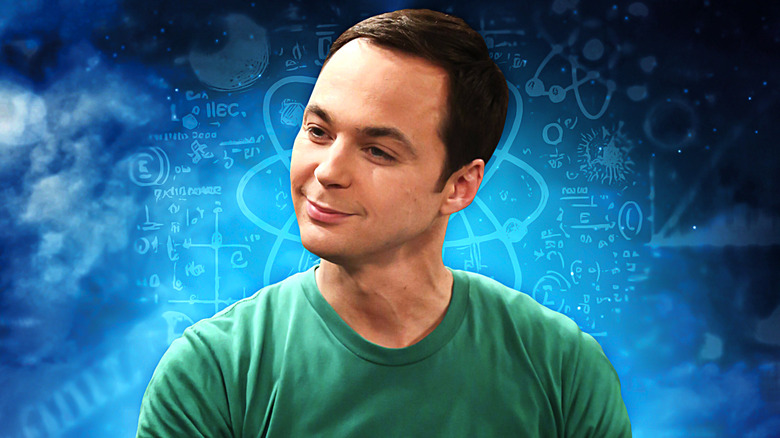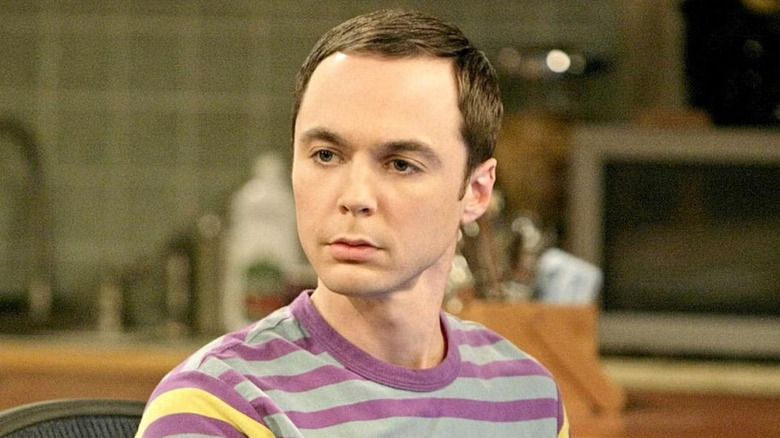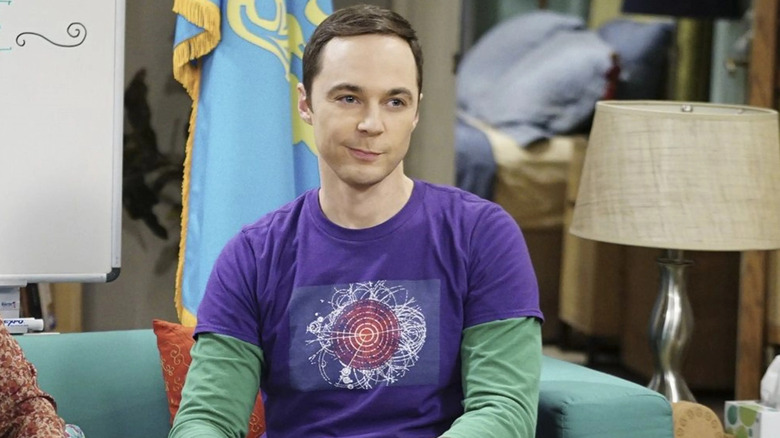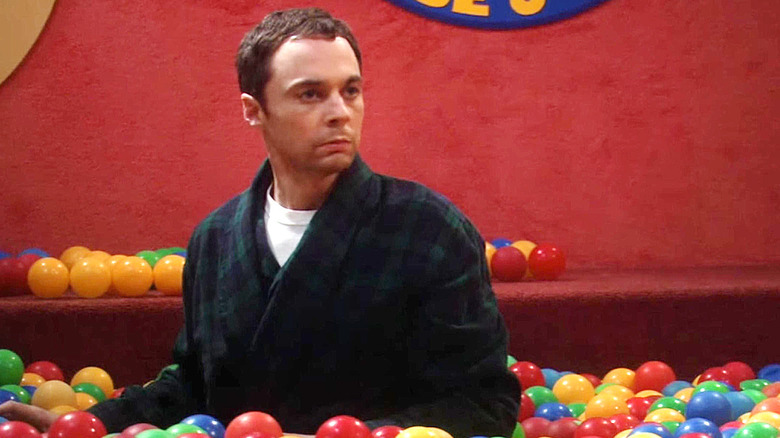The Secret Origin Of Sheldon Cooper's 'Bazinga' On The Big Bang Theory
We may receive a commission on purchases made from links.
When you think of "The Big Bang Theory," you probably think of a few identifying things. "Nerds." A laugh track. The made-up word "Bazinga." So, what's the deal with that last one? Why does Sheldon Cooper — played by Jim Parsons — say it on the CBS sitcom? According to an oral history of the series, the answer is pretty ridiculous.
In "The Big Bang Theory: The Definitive, Inside Story of the Epic Hit Series" by Jessica Radloff, some of the show's stars and creative team discussed "Bazinga" and how it became a part of the show. Though Sheldon says it during the series' second season, it truly became a "catchphrase" of sorts in the season 3 episode "The Einstein Approximation," which Radloff noted is more commonly known as "the ball-pit episode." As showrunner and executive producer Steve Molaro told it, the series' writing team was trying to come up with something funny for Sheldon to say in the episode — and they were inspired by a colleague.
While Sheldon is running loose in a ball pit (more on that whole thing shortly), he makes a joke, and as Molaro explained, his fellow showrunner and creator Chuck Lorre wanted the audience to know Sheldon is intentionally being cheeky in this moment. While the series' creatives were trying to figure it out, Molaro recalled, they realized one of their own had the key: writer Stephen Engel. "Stephen would intentionally play terrible practical jokes in the writers room to be funny, like a room bit," Molaro told Radloff. "He would have a grapefruit, and when he finished his grapefruit, he would put the two halves back together with scotch tape and say, 'Hey, would somebody like a grapefruit?' You'd say, 'Sure, Stephen, thank you. This grapefruit looks amazing.' And we'd pull the two halves apart knowing that they were taped together, and he would say, 'Haha, bazinga, gotcha!' And that's where it came from. It's kind of a boring story, actually."
The word bazinga blew up in a way that felt wholly unexpected for the Big Bang Theory team
The thing about having a "catchphrase" is that at some point, it starts to suck. You can't just keep substituting catchphrases for jokes when you're out of options — it's hacky. To give full credit to the creative team behind "The Big Bang Theory," they knew the shelf life of "bazinga" was probably pretty limited. Unfortunately, it was already huge ... even though the show basically stopped using it once it became popular.
"We had a complicated relationship with bazinga because it felt like it was becoming a catchphrase in a sort of not-great way, so we retired it almost entirely," writer Steve Holland said. "After season 4 or 5, we almost never said it, but it was always the thing that was associated with 'Big Bang.' And sometimes in a detrimental way, because people would use it to mock the show sometimes. We maybe said it 30 times — if that — over the course of 279 episodes. But we couldn't escape it. And yet, people loved it and latched on to it and it was part of the show's identifying features."
Chuck Lorre, the show's creator, agreed with Holland that the damage was done the second Sheldon said "bazinga" in the first place, but it was already adorning fan apparel. "We said, 'Oh no, we do not want a funny catchphrase. We do not want to go down that road; it's a cheap road,'" Lorre recalled. "But no one agreed with us. They all kept writing about it as if it were a part of the show. And we dropped it immediately when it became a T-shirt. We still can't get away from it, but no harm, no foul. At the time, we were trying to grow the show, and a show with catchphrases is not the show we wanted to do."
Bazinga was a small part of The Big Bang Theory, but it became a huge part of the show's legacy
Unsurprisingly, the "Big Bang Theory" crew immediately worried that "bazinga" would spiral out of control and make the show vaguely intolerable. "I was afraid that it was just going to wear out its welcome," Steve Molaro explained in Radloff's book. "Those catchphrases are a double-edged sword. If we were going to mention the word, there had to be a really good reason or joke." So, how did star Jim Parsons feel about the whole thing? He doesn't really care, but he knows it's associated with Sheldon Cooper forever.
In fact, thanks to the fan fixation on "bazinga," Parsons started experiencing a sort of Mandela effect regarding the nonsense word. "I fell into the trap of people who thought I said that all the time on the show, but the truth is, I didn't," Parsons admitted. "What I did was sign T-shirts with my face and that word on it time and time again, so in that way, I have kind of an 'eh' relationship with the word. It doesn't mean anything emotionally to me. But everybody felt so deeply in their own ways about it."
When it came to shooting the ball-pit episode, saying bazinga wasn't the biggest issue
Shouting the word "bazinga!" in lieu of a joke probably feels sort of bad if you're an actor, but the worse part of this entire situation is that, according to Jim Parsons and his "Big Bang Theory" co-star Johnny Galecki — who plays Sheldon's best friend Leonard Hofstadter — filming the scene itself was pretty disgusting. In the episode, everyone is completely sick of Sheldon because, while working on a research project, he's refusing to sleep; eventually, he grows so manic that he breaks into a shopping mall ball-pit and forces Leonard to chase him in it while he keeps yelling "bazinga!" As Parsons explained in Jessica Radloff's book, he "hated" shooting this scene because it was really, really gross.
"It was a lot more effortful than one would imagine it to be, or I would have imagined it to be. And the balls were so dirty. I had to go to the bathroom during a break while we were shooting that scene, and I wiped my hands on these paper towels, and I realized I was covered in a light gray ash from these balls. I was like, I'm so f***ing disgusted! But there's nothing I won't do for a scene, as it turns out, between snakes, monkeys, and God knows what else." (Parsons did follow up with an admission: "I mean, I was being paid, so there was that. Maybe it's just that I'll chase a paycheck. I have no idea. But I did it.")
In any case, if you want to hear Parsons yell "bazinga!" while he's rooting around in an apparently filthy ball-pit, "The Einstein Approximation" is currently available to stream on Max along with the rest of "The Big Bang Theory."



